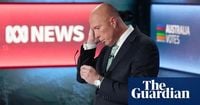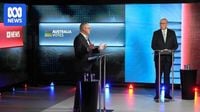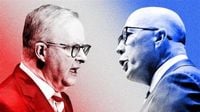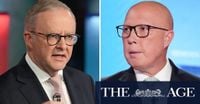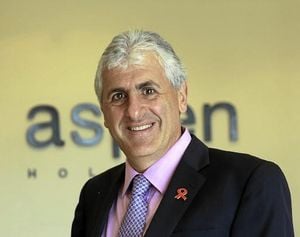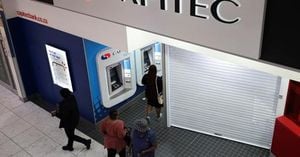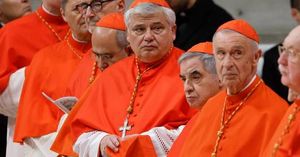Prime Minister Anthony Albanese and Opposition Leader Peter Dutton faced off in their second leaders' debate on April 16, 2025, showcasing a heated exchange over crucial topics such as energy policy, cost of living, and international relations. The debate, held on ABC, was a pivotal moment in the ongoing election campaign, as both leaders sought to persuade undecided voters while addressing pressing national concerns.
During the debate, Albanese was notably evasive when asked a critical question about when Australians could expect relief from rising power bills. Despite being pressed four times by host David Speers, he failed to provide a straightforward answer. Instead, Albanese pivoted to discussing renewable energy, claiming, "renewables are the cheapest form of power," and emphasized the need for energy security backed by batteries, hydro, and gas.
Dutton, meanwhile, seized the opportunity to critique Labor's energy policies, effectively landing points against Albanese's government. However, he also missed opportunities to assert himself on defense issues, an area where he typically shines. Notably, Dutton conceded that he did not personally know U.S. President Donald Trump, a stark contrast to his earlier assertions of having a direct connection. He also admitted he did not know Chinese President Xi Jinping, which raised questions about his foreign policy credentials.
The debate took a serious tone as discussions turned to international relations, particularly concerning Russia's recent request to access an Indonesian air base located just 1400 km north of Darwin. Albanese attempted to highlight his administration's efforts to improve relations with China, particularly lifting trade sanctions, while Dutton criticized Labor's approach as lacking strength. He boasted about former Treasurer Joe Hockey's rapport with Trump, contrasting it with the current ambassador's inability to make contact.
As the debate progressed, Dutton opened with a strong attack on Labor's handling of the economy and cost-of-living pressures. Albanese, in turn, expressed optimism about Australia’s future, citing improving economic indicators such as inflation, unemployment, and real wages, despite acknowledging that more work was needed. Throughout the debate, Albanese appeared at times to be pushing a rehearsed list of achievements, which some observers likened to a door-to-door salesman.
Both leaders positioned themselves as the superior economic managers, with Albanese claiming that Labor was responsible for recent economic improvements, despite an ABC graph indicating more government spending than revenue. Dutton, when pressed about his proposed $7 billion cuts to public services, repeatedly dodged direct questions, instead stating that he would find "inefficiencies" if elected.
Energy policy sparked some of the most intense exchanges of the night. Dutton discussed his nuclear energy plans more than he had on the campaign trail, while Albanese criticized these plans as costly and slow, arguing that renewables were a more viable option. He stated that Australia cannot afford to wait until the 2040s for energy security, emphasizing the urgency of transitioning to renewable energy sources.
Housing policy was another topic of discussion, albeit not as dominant as anticipated. There was significant dialogue around negative gearing, with Dutton arguing that scrapping it would harm renters by reducing housing investment. Albanese, however, avoided directly answering questions about changes to this policy.
Women’s issues were largely overlooked during the debate, with only child care emerging as a topic when Albanese was asked about his legacy-defining reform. He highlighted achievements in women's health toward the end of the debate, while Dutton focused on his energy plan as a cornerstone of his vision for the future.
As the debate concluded, Dutton reiterated his central message: "Are you better off?" He promised a government focused on immediate relief for cost-of-living issues, defense, and safety. Conversely, Albanese warned of potential Coalition cuts to health and education while praising Medicare and emphasizing his commitment to climate action and gender equality.
Looking ahead, both leaders are preparing for further debates, with another scheduled for April 22 and a final showdown on April 27 before the election. Albanese is also expected to address the Leadership Matters event on April 24, following Dutton's earlier appearance.
As the campaign continues, questions remain about Dutton's readiness for leadership and how he would implement his proposed policies if elected. With both leaders facing scrutiny over their responses and policy details, the upcoming debates will be crucial in shaping public perception and voter decisions.
